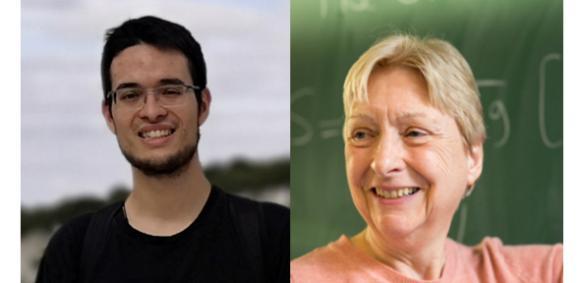
This prestigious annual prize recognises boundary-pushing, ground-breaking work in cosmology with the potential to produce a breakthrough advance in our understanding of how the Universe works.
Dr. Sunny Vagnozzi and Prof. Anne-Christine Davis of the University of Cambridge's Kavli Institute for Cosmology (KICC) have been awarded the 2021 Buchalter Cosmology Prize for their boundary-pushing work in cosmology, proposing novel ways to search for dark energy on Earth. Vagnozzi and Davis described their findings in the paper “Direct detection of dark energy: the XENON1T excess and future prospects” (paper available here, University of Cambridge press release with popular-level explanation of the results available here). The judging committee recognised the work as “opening new, unforeseen vistas for the scientific scope of direct detection dark matter experiments, exploring the tantalising prospect for terrestrial dark matter experiments to directly detect scalar particles, associated with the dark sector, produced in the strong magnetic field of the solar interior.” For this work, Vagnozzi and Davis were awarded third prize and $2500 alongside their collaborators Luca Visinelli at Shanghai Jiao Tong University, Philippe Brax at the University of Paris-Saclay, and Jeremy Sakstein at the University of Hawaii (both Brax and Sakstein have been associated to the University of Cambridge in the past).
In their work, Vagnozzi, Davis, and collaborators proposed innovative ways of searching for dark energy, the mysterious component responsible for the accelerated expansion of the Universe and which accounts for 70% of its energy budget. Working in the context of screening mechanisms which suppress unwanted fifth forces associated to the dark energy itself, they showed that it is possible to search for dark energy on Earth, using big underground experiments which are instead devoted to the direct detection of dark matter (the other dark component accounting for 25% of the energy budget of the Universe, and which holds the cosmic web together). Experiments nominally planned to search for dark matter may therefore be used to search for dark energy at the same time, at zero extra cost: two birds with one stone! One such direct detection experiment, XENON1T, observed an excess over the expected background in 2020: Vagnozzi and Davis argued that dark energy particles produced in the Sun and travelling here to us on Earth may in principle have been responsible for this excess.
The Buchalter Cosmology Prize is a prestigious annual prize seeking to stimulate ground-breaking work in cosmology with the potential to produce a breakthrough advance in our understanding of how the Universe works, and was established in 2014 by Ari Buchalter, a former astrophysicist who turned into an extremely successful entrepreneur. The prize was conceived on the basis that there are fundamental gaps in our understanding of cosmology, and therefore rewards and encourages the pursuit of groundbreaking, paradigm-challenging ideas, to fundamentally advance our thinking and understanding of physics. These are the types of ideas which the University of Cambridge has valued and produced throughout its rich and illustrious history, and the kind of work modern cosmology needs. In fact, it is the second year in a row that the prize goes to KICC researchers, as Anastasia Fialkov and collaborators won the 2020 Buchalter Cosmology Prize (third prize). These prizes recognise the University of Cambridge’s long-standing tradition of pushing back the frontiers of knowledge about the Universe, particularly within interdisciplinary centres such as the KICC, which encourage out-of-the-box thinking and collaborations between researchers with a range of diverse but complementary interests, which is precisely how Vagnozzi and Davis’ paper was born.
